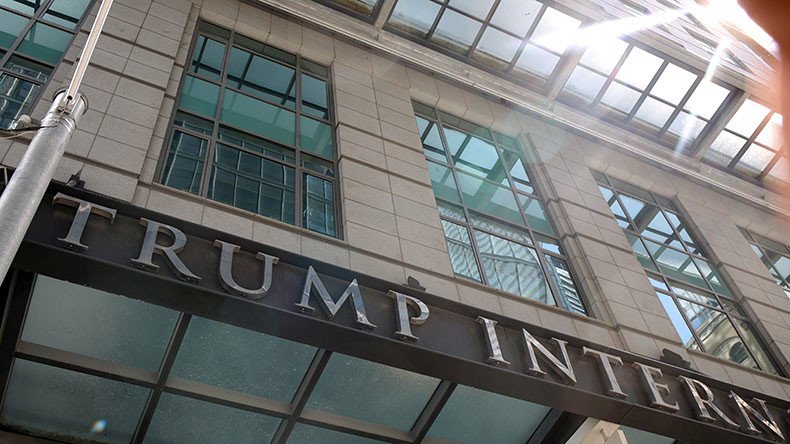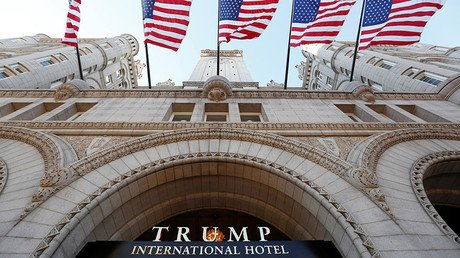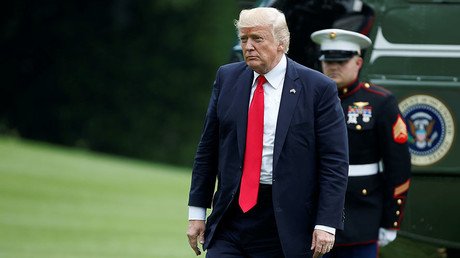‘Uncharted waters’: Judge questions reasoning behind Trump Emoluments lawsuit

A federal judge has raised concerns over the arguments from both parties in a lawsuit filed against President Donald Trump, which alleges that he violated the Constitution’s Emoluments Clause by accepting money from foreign governments through his businesses.
On Wednesday, US District Judge George Daniels heard opening arguments in the first case in US history concerning the Emoluments Clause of the US Constitution, which states that “no person holding any office of profit or trust under them, shall, without the consent of the Congress, accept any present, emolument, office, or title, of any kind whatever, from any king, prince, or foreign state.”
The lawsuit was filed three days after Trump took office in January by Citizens for Responsibility and Ethics in Washington, a left-leaning legal watchdog group. CREW argues that Trump is in violation, since he didn't put his businesses in a blind trust after becoming president.
In a statement released Wednesday, CREW explained they filed the lawsuit to ensure Trump is “not being influenced by payments from foreign governments, state governments, or the federal government.”
Around the same time the lawsuit was launched, CREW chairman David Brock, a supporter of Hillary Clinton, was spending a weekend with major Democratic donors seeking to defeat Trump through impeachment and litigation, according to a memo obtained by the Washington Free Beacon.
However, to move the case forward, CREW must show that their plaintiffs have legal “standing,” or sufficient connection or harm, to sue the president.
In court documents, CREW argued that Trump’s businesses have caused “direct economic injury” to New York hotel mogul Eric Goode, an association of restaurants and restaurant workers, and an events booker for two hotels in Washington, DC.
However, in a motion to dismiss the case, Trump's Justice Department argued that the lawsuit lacks standing, saying that the plaintiff’s claims of economic injury are “purely self-inflicted and lacks any of the hallmarks of organizational standing.”
During the hearing on Wednesday, CREW Attorney Deepak Gupta argued the co-plaintiffs have lost business to Trump hotels, because many foreign officials stay at Trump Hotels “to curry favor” with the president, Courthouse News reported.
Deputy Assistant Attorney General Brett Shumate argued that Trump did not violate the clause, since he has been “engaging in ordinary business transactions, not in exchange for anything."
Judge Daniels questioned Shumate’s reasoning, arguing that the two are not necessarily exclusive.
“Just because it's a business transaction doesn't necessarily mean it's not an emolument,” Daniels said, according to Reuters.
Shumate argued that the case should be dismissed, saying that Trump’s business arrangements should be handled by Congress, not the courts.
On that point, Daniels seemed to agree that Congress might be better suited to decide if the president has violated the Emoluments Clause.
"They can make this an issue, but they have not done so," Daniels said. "Why is it appropriate for the judiciary to have the president fight this out in a street brawl?"
This is the first time the courts have heard a case on the Emoluments Clause, so there is no precedent.
“You both are [in] uncharted waters,” Daniels said.
Daniels did not make a decision, but said he plans to issue a ruling on whether the case can move forward within two months.
Noah Bookbinder, executive director of CREW, said that if they win on the standing question, they will move to the discovery phase, where they would ask the Trump Organization to turn over documents, such as “business records for the Trump companies and other relevant documents, potentially including tax returns.”
“This is a pretty big deal,” Bookbinder said, according to NPR. “It's the first time that a court is going to be hearing arguments about the Emoluments Clause, what an emolument is, what the president actually is prohibited from doing under the Constitution.”














